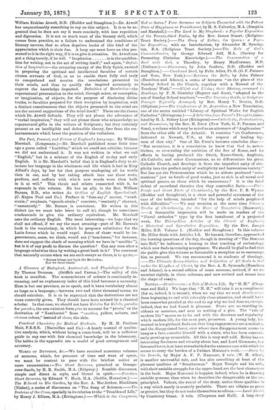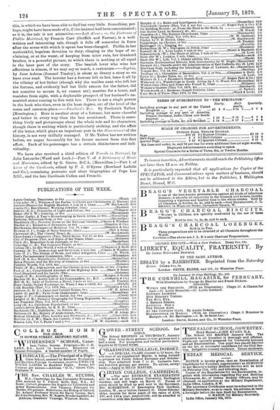NOVELS.—Strathrowan : a Tale of Modern Life. By "M. H."
(Chap- man and Hall.) We hope that "M. H." will take it as a compliment (for so, indeed, it is meant), when we say that we read Strathrotraa. from beginning to end with tolerably close attention, and should have been somewhat puzzled at the end to say why we had done so, except, indeed, that we had found it pleasant. There are no startling in- cidents or surmises, and next to nothing of a plot. The "tale of modern life" moves on to its end with the decorum and regularity which modern life, for the most part, preserves. A young lady, be- trothed in her girlhood, finds out that long engagements are a mistake, and the disappointed lover, over whose race disappointment seems to hang as a fate, consoles himself with a sister, who has been conveni- ently growing up meanwhile. All this is very well told. Helen has an interesting freshness and vivacity about her, and Lord Glenmore, her favoured lover, is at least remarkable for the extreme ease with which lie seems to carry the burden of a Cabinet Minister's work.—Down bj the Drawle, by Major A. F. P. Harcourt, 2 vols. (W. H. Allen), is another uneventful tale, and has also something at least of the pleasant qualities of " Strathrowan." Major Temple and his wife, with their amiable struggle for the upper-hand, are the best characters in the book. Major Harcourt is happier, indeed, when he is drawing amiable persons, than when he describes the disagreeable or the un- principled. Velters, the rascal of the story, unites these qualities in a way which surely is scarcely probable. There are villains as great or greater, but they do not make themselves so odious.—Land Ahead, by Courteney Grant. 3 vols. (Chapman and Hall). I long story this, in which we have been able to find but very little. Something, per- haps, might have been made of it, if the interest had been concentrated ; as it is, the tale is not attractive.—Left Alone ; or, the Fortunes of Phillis Maitland, by Francis Carr (Griffith and Ferran), is a well- written and intesesting tale, though it falls off somewhat in force after the scene with which it opens has been changed. Phillis, in her unthankful, hopeless devotion to duty, clinging to the hope of re- claiming, or at the worst, of keeping from utter ruin, her drunkard brother, is a powerful picture, to which there is nothing at all equal in the later part of the story. The bearish lover who wins her affections is almost, if we may say so much, a caricature.—Sophia, by Jane Ashton (Samuel Tinsley), is about as dreary a story as we have ever read. The heroine has a fortune left to her, loses it all by the villainy of her father (though why the maiden aunt who left her the fortune, and evidently had but little esteem for the father, did not contrive to secure it, we cannot see), marries for a home, and vanishes from sight, with a deplorable prospect of her husband's un- married sister coming to live with her. There is not a single person in the book who rises, even in the least degree, on of the level of the mean and common-place.—Pandora's Box. By Frederick Talbot. (Remington.) Here is another story of a fortune, but more cheerful and better in every way than the last mentioned. There is some- thing lively and picturesque about the whole tale and its characters, though there is nothing which is particularly striking, and the affair of the letter, which plays an important part in the denouement of the history, is not very skilfully managed. If Mr. Talbot has not written before, we augur favourably for his future success from this first effort. Each of his personages has a certain distinctness and indi- viduality.



































 Previous page
Previous page